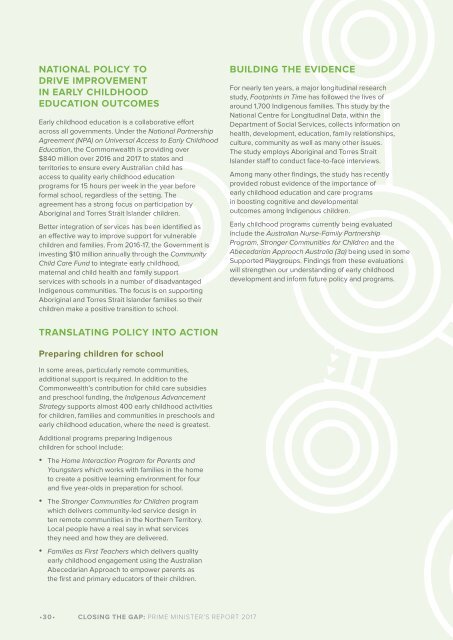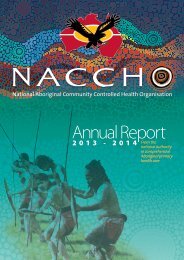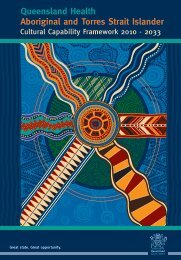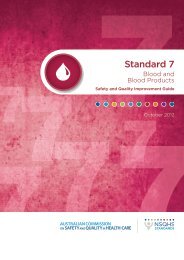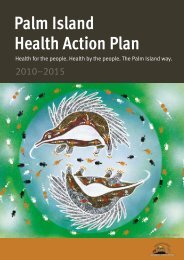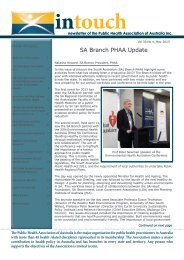CLOSING THE GAP
ctg-report-2017
ctg-report-2017
You also want an ePaper? Increase the reach of your titles
YUMPU automatically turns print PDFs into web optimized ePapers that Google loves.
NATIONAL POLICY TO<br />
DRIVE IMPROVEMENT<br />
IN EARLY CHILDHOOD<br />
EDUCATION OUTCOMES<br />
Early childhood education is a collaborative effort<br />
across all governments. Under the National Partnership<br />
Agreement (NPA) on Universal Access to Early Childhood<br />
Education, the Commonwealth is providing over<br />
$840 million over 2016 and 2017 to states and<br />
territories to ensure every Australian child has<br />
access to quality early childhood education<br />
programs for 15 hours per week in the year before<br />
formal school, regardless of the setting. The<br />
agreement has a strong focus on participation by<br />
Aboriginal and Torres Strait Islander children.<br />
Better integration of services has been identified as<br />
an effective way to improve support for vulnerable<br />
children and families. From 2016-17, the Government is<br />
investing $10 million annually through the Community<br />
Child Care Fund to integrate early childhood,<br />
maternal and child health and family support<br />
services with schools in a number of disadvantaged<br />
Indigenous communities. The focus is on supporting<br />
Aboriginal and Torres Strait Islander families so their<br />
children make a positive transition to school.<br />
BUILDING <strong>THE</strong> EVIDENCE<br />
For nearly ten years, a major longitudinal research<br />
study, Footprints in Time has followed the lives of<br />
around 1,700 Indigenous families. This study by the<br />
National Centre for Longitudinal Data, within the<br />
Department of Social Services, collects information on<br />
health, development, education, family relationships,<br />
culture, community as well as many other issues.<br />
The study employs Aboriginal and Torres Strait<br />
Islander staff to conduct face-to-face interviews.<br />
Among many other findings, the study has recently<br />
provided robust evidence of the importance of<br />
early childhood education and care programs<br />
in boosting cognitive and developmental<br />
outcomes among Indigenous children.<br />
Early childhood programs currently being evaluated<br />
include the Australian Nurse-Family Partnership<br />
Program, Stronger Communities for Children and the<br />
Abecedarian Approach Australia (3a) being used in some<br />
Supported Playgroups. Findings from these evaluations<br />
will strengthen our understanding of early childhood<br />
development and inform future policy and programs.<br />
TRANSLATING POLICY INTO ACTION<br />
Preparing children for school<br />
In some areas, particularly remote communities,<br />
additional support is required. In addition to the<br />
Commonwealth’s contribution for child care subsidies<br />
and preschool funding, the Indigenous Advancement<br />
Strategy supports almost 400 early childhood activities<br />
for children, families and communities in preschools and<br />
early childhood education, where the need is greatest.<br />
Additional programs preparing Indigenous<br />
children for school include:<br />
• The Home Interaction Program for Parents and<br />
Youngsters which works with families in the home<br />
to create a positive learning environment for four<br />
and five year-olds in preparation for school.<br />
• The Stronger Communities for Children program<br />
which delivers community-led service design in<br />
ten remote communities in the Northern Territory.<br />
Local people have a real say in what services<br />
they need and how they are delivered.<br />
• Families as First Teachers which delivers quality<br />
early childhood engagement using the Australian<br />
Abecedarian Approach to empower parents as<br />
the first and primary educators of their children.<br />
•30• <strong>CLOSING</strong> <strong>THE</strong> <strong>GAP</strong>: PRIME MINISTER'S REPORT 2017


